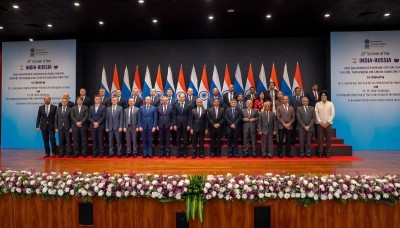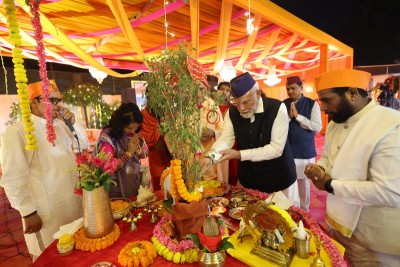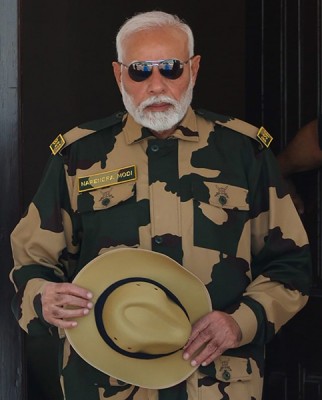 Pakistan
Pakistan
Turbulent Nation
The chronic political disorders in Pakistan turned into a full-blown crisis with the arrest of former Prime Minister (PM) and Pakistan Tehreek-e-Insaf (PTI) chairman Imran Khan on May 9, 2023, in one of the 143 ongoing cases against him.
The subsequent violence unleashed by his party cadres/supporters, was unprecedented even by Pakistani standards. Imran Khan is now out of jail following a Supreme Court (SC) order and the violence has subsided, but a more chaotic situation is likely to emerge, as the Pakistan Democratic Movement (PDM) government, working in tandem with the all-powerful Military Establishment, seems hell-bent on his re-arrest. Khan’s anti-Military Establishment line remains unchanged, and has, indeed, become even more belligerent.
Significantly, on May 9, when Imran appeared before a court in Islamabad, the national capital, he was arrested from inside the courtroom “for the crime of corruption” in the Al-Qadir Trust headed by him and his wife Bushra Bibi. Immediately after the arrest, which his party termed an abduction by the State Forces from the courtroom, PTI cadres and supporters unleashed large-scale violence. Though Pakistan has a long history of political leaders being jailed or killed or ousted from power, never before has the retaliation been so strong.
Indeed, soon after Khan’s arrest in Islamabad, protests erupted in the city and spread rapidly to other parts of the country, including major cities such as Rawalpindi, Lahore, Karachi, Gujranwala, Faisalabad, Multan, Peshawar and Mardan. Crowds of protesters, mostly PTI supporters, chanting Allahu Akbar and Nara-e-Takbeer lined up on the streets of Pakistan, going on a rampage against security establishments and personnel. In the most daring attack, which may have a long-lasting impact on Army’s position in Pakistan, protestors stormed the General Headquarters of the Pakistan Army in the garrison city of Rawalpindi – the absolute seat of the Army’s power. The Inter-Services Intelligence (ISI) Headquarters in Islamabad also came under attack. The Corps Commander's residence in Lahore was also ransacked and vandalized. Several videos on social media depicting pictures of mayhem across Pakistan flooded the Internet, as violent protests spread.
On May 9, the government restricted mobile internet services across the country and prohibited the use of social media platforms such as YouTube, Twitter, Instagram and Facebook. Even on May 13, the Pakistan Telecommunications Authority disclosed that it had received no instructions to restore access to social media, though mobile internet services had been restored across the country.
Meanwhile, according to reports at least 10 people were killed and several hundred wounded, including Army and police officers. Khan, however, alleged that that 'live fire' by Security Forces (SFs) had killed at least 40 protesters.
Earlier, after the Islamabad High Court (IHC) ruling that Khan's arrest was "legal", he had appealed to the SC. On May 11, the SC termed the arrest "invalid and unlawful" and ordered his release but asked the Police to keep him under protection and produce him before the IHC on May 12. The SC order read,
The petitioner is directed to be produced before the Islamabad High Court tomorrow i.e. 12.05.2023 [May 12] at 11:00 am for hearing of his Writ Petition filed to challenge the NAB [National Accountability Bureau] action against him in the Al-Qadir Trust Case. This (Supreme Court) order shall remain valid until the production of the petitioner before the High Court in the aforementioned Writ Petition tomorrow i.e. 12.05.2023 at 11:00 am and shall be subject to any order that is passed by the High Court.
The SC directed Khan to follow the decision taken by the IHC on his petitions.
As directed, Imran appeared before the IHC on May 12, which granted him a two-week bail in the Al-Qadir Trust case. However, apprehensive of getting arrested in other cases filed earlier, Khan’s lawyers appealed to the IHC to grant him protective bail. As a result, the Court barred the authorities from arresting him till May 15 in all such cases. It also barred authorities from arresting him till May 17, in any cases registered in the jurisdiction of Islamabad after May 9.
After the orders, while hailing the judiciary, a buoyant Khan continued with his tirade against the Army, declaring, on May 12, “it’s not the security institution, it is just one man, the Army Chief” who was responsible for his arrest, adding, “there is no democracy in the Army.” Interestingly, many in Pakistan insist that Khan was elected as PM in 2018 with the support of the Military Establishment. He has now paid the price for his attempts to free himself from the Army’s clutches. Indeed, he was ‘voted out’ as PM by the National Assembly in April 2022, after persistent political chaos orchestrated by the Army, and spearheaded by the opposition parties. Before the vote of confidence, 123 PTI Members of the National Assembly, including Khan, resigned and walked out of the House. Khan also faced an attack on his life on November 3, 2022.
However, with its 'prestige' severely hit due to the PTI protests, the Army is in no mood for any rapprochement with Khan and seems to be preparing to take harsh actions against him and his party and to bring down the curtain on his political career. An Inter-Services Public Relations (ISPR) release on May 10 thus observed,
May 9 will be remembered as a dark chapter. Immediately after his [Imran Khan's] arrest, there were organised attacks on Army properties and installations and anti-Army slogans were raised. His group, wearing a political cloak, has done what enemies could not do in 75 years, all in the lust for power. The Army showed patience and restraint and exercised extreme tolerance, not even caring about its reputation, in the larger interest of the country. The Army's mature response thwarted this conspiracy. We are well aware that behind it were orders, directives and complete pre-planning by some sinister party leadership. Facilitators, planners and political activists involved in these operations have been identified and strict action will be taken against them as per the law and all these evil elements will now be responsible for the consequences.
The statement warned, further, that any future attack on the Army as well as any law enforcement agency, military and state installation or properties, would attract severe retaliation against the group that "wants to push Pakistan into a civil war".
On May 12, Army Chief General Syed Asim Munir declared,
Armed Forces will not tolerate any further attempt of violating the sanctity and security of its installations or vandalism and resolved to bring to justice all the planners, abettors, instigators and executors of vandalism on the Black Day of 9th May.
Indeed, SFs have unleashed a crackdown against the PTI. Top PTI leaders, including Shah Mahmood Qureshi, Fawad Chaudhry, Asad Umar and Omer Cheema, were taken into custody within 24 hours of the beginning of the protest and transferred to Adiala Jail under detention for 15 days. At the time of writing, SF personnel, had rounded up over 1,800 PTI leaders and supporters since May 9.
The civilian government and the parties in the ruling alliance, working in tandem with the Military Establishment, meanwhile, have launched a scathing attack on the SC's decision to release Imran. On May 12, commenting on the SC order, PM Shehbaz Sharif stated that if the "favourite [Imran]" continued to be favoured, then all dacoits behind bars should be also released across Pakistan. "These are the double standards that have brought about the death of justice," he lamented. On May 12, while speaking on the SC's verdict, Federal Minister of the Interior Rana Sanaullah asserted that whatever had happened was "unprecedented" and "there is no example of such judicial decisions and means of facilitation are being invented. In the most scathing attack, Pakistan Muslim League-Nawaz (PML-N) Chief Organiser, Maryam Nawaz, tweeted,
The Chief Justice [of Pakistan] was very happy today to meet the person who usurped Rs 60 billion from the national exchequer, and he was even happier to release this criminal. The chief justice is primarily responsible for the attacks on the most important and sensitive installations in the country, as he has become the shield of fitna and is exacerbating the situation in the country by fueling the fire.
She advised Chief Justice of Pakistan Umar Ata Bandial to resign from his position and join PTI, just like his mother-in-law Mahjabeen Noon.
Not surprisingly, the authorities in Pakistan are waiting for the May 17 deadline to pass to arrest Khan in connection with the violent protests of May 9 and thereafter. Indeed, commenting on IHC's decision, on May 13, Rana Sanaullah, declared that the Court's orders would be implemented and Khan would not be arrested till May 17. He however, added,
We have all the evidence from every single day, we have his speeches. The cases have been filed and are still being filed. If there is a reason for his arrest, then he will be arrested. The courts can facilitate them but as per the law, we will take action against their anti-state and terror activities.
PM Sharif had earlier stated that "bringing these people [those involved in vandalism] to justice is a test case for the government. Their cases will be tried by the anti-terrorism courts".
All indications suggest an imminent escalation of the political crisis. There is a possibility also of a significant rise in terrorism, with the Tehreek-e-Taliban Pakistan (TTP) intensifying operations as well. It is useful to recall that Khan has long been relatively sympathetic to the TTP, long supporting a negotiated settlement with the terrorists, instead of kinetic operations against them. Of course, Khan has also alleged that the TTP was trying to kill him - a charge the TTP leadership has denied - but there is no reason to believe, if nothing more, that the TTP will take advantage of any compounding of the political disorders in the country to intensify its own campaign of terror.
Amidst a deteriorating security situation in the country due to escalating terrorism, more particularly after the withdrawal of the TTP from peace talks in November 2022, the volatile economic and uncertain political situation, Khan's onslaught, even after his release from jail, against the Military Establishment and the government has unnerved both the centres of national power. Nevertheless, it is useful to recall that the Army remains by far the most powerful institution in Pakistan. While there are several reports of increasing divisions within the Army leadership on Imran Khan and the PTI's recent actions, it is unlikely that these would be sufficient to force the Army to abandon its present hardline. Given the scale and character of the protests across the country after Khan's arrest, however, there can be no simple predictions of any easy outcome of the present contretemps - certainly in the long run. After a downslide over decades, Pakistan appears to be at the threshold of some very 'interesting times'.
Support Our Journalism
We cannot do without you.. your contribution supports unbiased journalism
IBNS is not driven by any ism- not wokeism, not racism, not skewed secularism, not hyper right-wing or left liberal ideals, nor by any hardline religious beliefs or hyper nationalism. We want to serve you good old objective news, as they are. We do not judge or preach. We let people decide for themselves. We only try to present factual and well-sourced news.







